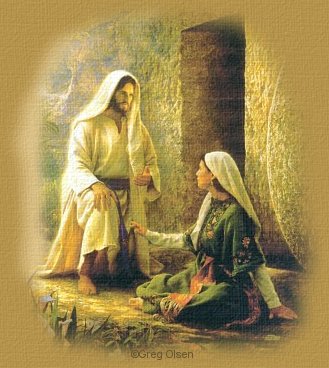|


Beauty from Ashes
By the Rev. Lee Woofenden
Bridgewater, Massachusetts,
April 15, 2001
Easter Sunday

Readings

Isaiah 61:1-3 Beauty instead of ashes
The
Spirit of the Sovereign Lord is on me, because
the Lord has anointed me to preach good news to
the poor. He has sent me to bind up the
broken-hearted, to proclaim freedom for the
captives and release from darkness for the
prisoners, to proclaim the year of the Lord's
favor and the day of vengeance of our God, to
comfort all who mourn, and provide for those who
grieve in Zion--to bestow on them a crown of
beauty instead of ashes, the oil of gladness
instead of mourning, and a garment of praise
instead of a spirit of despair. They will be
called oaks of righteousness, a planting of the
Lord for the display of his splendor.

Mark 16 The Resurrection
When
the Sabbath was over, Mary Magdalene, Mary the
mother of James, and Salome bought spices so
that they might go to anoint Jesus' body. Very
early on the first day of the week, just after
sunrise, they were on their way to the tomb and
they asked each other, "Who will roll the
stone away from the entrance of the tomb?"
But
when they looked up, they saw that the stone,
which was very large, had been rolled away. As
they entered the tomb, they saw a young man
dressed in a white robe sitting on the right
side, and they were frightened. "Don't be
frightened," he said. "You are looking
for Jesus the Nazarene, who was crucified. He
has risen! He is not here. See the place where
they laid him. But go, tell his disciples and
Peter, 'He is going ahead of you into Galilee.
There you will see him, just as he told
you.'"
Trembling
and bewildered, the women went out and fled from
the tomb. They said nothing to anyone, because
they were afraid.
When
Jesus rose early on the first day of the week,
he appeared first to Mary Magdalene, out of whom
he had driven seven demons. She went and told
those who had been with him and who were
mourning and weeping. When they heard that Jesus
was alive and that she had seen him, they did
not believe it.
Afterwards
Jesus appeared in a different form to two of
them while they were walking in the country.
These returned and reported it to the rest; but
they did not believe them either.
Later
Jesus appeared to the Eleven as they were
eating; he rebuked them for their lack of faith
and their stubborn refusal to believe those who
had seen him after he had risen.
He
said to them, "Go into all the world and
preach the good news to all creation. Whoever
believes and is baptized will be saved, but
whoever does not believe will be condemned. And
these signs will accompany those who believe: In
my name they will drive out demons; they will
speak in new tongues; they will pick up snakes
with their hands; and when they drink deadly
poison, it will not hurt them at all; they will
place their hands on sick people, and they will
get well."
After
the Lord Jesus had spoken to them, he was taken
up into heaven and he sat at the right hand of
God. Then the disciples went out and preached
everywhere, and the Lord worked with them and
confirmed his word by the signs that accompanied
it.

Arcana Coelestia #2405 The Lord's
resurrection in us
"Morning,"
in its genuine meaning, symbolizes the Lord and
his coming, and therefore the coming of his
kingdom. So it is clear what else is meant by
"morning," namely, the rise of a new
church; for that church is the Lord's kingdom on
earth.
The
Lord's kingdom is meant both generally and in
individual cases, and even in specific
instances. The kingdom of the Lord comes in a
general way when any church on earth is
re-established on a new basis. It comes
individually when we as individuals are
spiritually reborn and become new people, for
the Lord's kingdom is then being established in
us and we are becoming the church. And it
happens specific instances as often as the
goodness that flows from love and faith is at
work in us, since this is what the Lord's coming
consists of.
So
the Lord's resurrection on the third morning
embodies in an individual and specific sense the
truth that the Lord rises in our minds daily,
and even every single moment, when we have been
spiritually reborn.

Sermon
The
Lord has sent me to bind up the broken-hearted,
to proclaim freedom for the captives and release
from darkness for the prisoners . . .
to bestow on them a crown of beauty instead of
ashes, the oil of gladness instead of mourning,
and a garment of praise instead of a spirit of
despair. (Isaiah 61:1, 3)
The
phoenix was a legendary bird of Egyptian and
Greek mythology. It was a large and beautiful
bird at least the size of an eagle, with
brilliant gold and reddish-purple feathers. As
the most common form of the legend goes, every
five hundred years, when it came time for the
phoenix to die, it would build itself a nest
that was also its funeral pyre, set the nest on
fire, and be consumed in the flames.
However,
that ending was also a new beginning. Out of the
ashes of the bird that had been consumed by
fire, a new phoenix, young, strong, and
beautiful, would arise and begin its five
hundred year life cycle. So the phoenix
symbolized immortality and spiritual rebirth. It
also represented the sun, which dies in its
flames each evening, and emerges new and
powerful each morning. The sun, in turn, has
from ancient times been seen as a symbol of the
Creator God, from whom all life comes.
The
prophet Isaiah was sent by God with a similar
message of spiritual rebirth and new life to a
people whose future captivity and exile under
the Babylonian empire he had already prophesied.
In effect, he said, "You will be destroyed
as a people and driven from your land. But in
your misery, the Lord will visit you, and
restore you to joy and gladness in your own
land." In figurative language, he said that
the Lord would "bestow on them a crown of
beauty instead of ashes, the oil of gladness
instead of mourning, and a garment of praise
instead of a spirit of despair."
Beauty
instead of ashes. For the ancient Israelites,
ashes carried a greater meaning beyond being the
remains after something had been destroyed by
fire. Ashes had taken on an additional symbolic
meaning. Whenever the Israelites were in
mourning, or some great disaster had fallen upon
them, or they had received a message of
punishment from God because of their
disobedience and waywardness, they would show
their sorrow and repentance by putting ashes on
their head, and also by wearing coarse sack
cloth (think: burlap) in place of their usual
comfortable garments. So ashes symbolized
sadness and mourning.
While
we tend to hide our sorrow and mourning from
others, the ancient Israelites were very public
about theirs. No one could miss someone who was
in mourning! And needless to say, people who
walked around wearing sackcloth, and with ashes
all through their hair, were not the most
beautiful sight. In a time of great national
catastrophe, nearly everyone would be walking
around in sackcloth and ashes, and it was a
pitiful sight.
So
the promise of beauty instead of ashes, the oil
of gladness instead of mourning (oil was used as
an aid to beauty), and a garment of praise
instead of a spirit of despair had a wonderful
feeling. It spoke of catastrophe and pain being
lifted off their shoulders, and replaced with
the joy of freedom, the warmth of love, and the
richness of life.
As
always, the Bible is not talking only about
events that took place thousands of years ago
among a people who have long since ceased to
exist on this earth. It is also talking about
our lives today. We all have our times of pain
and struggle, of grief and sadness, of
depression and despair. Like the mythological
phoenix, we all come to times when our life as
we have known it is going up in smoke; when it
seems as if everything is at an end. We all have
times when we feel that there is no use
continuing, because there is nothing left to
live for. And these times seem to come around a
lot more often than every five hundred years!
For
the ancient Greeks and Egyptians, the legend of
the phoenix gave precious hope in times of
despair. For the ancient Israelites, Isaiah's
beautiful prophecy gave a similar hope when it
seemed as if their nation had been destroyed and
they would never again know gladness. As
Christians, when we are at the low points of our
lives. we have an even greater source of hope,
and an even greater promise of new life and joy.
It is the event that we celebrate today: the
resurrection of our Lord Jesus Christ.
With
nearly two thousand years worth of hindsight, as
we read the story of the crucifixion and the
women going to the tomb to anoint Jesus' body,
it is hard not to be thinking of what came next.
But when those women actually went to the tomb,
they had no expectation of finding anything
other than the dead body of the one they had
called Lord and Master. Their hopes had been
crushed; the one who gave them joy and salvation
was dead; and all that was left to do was to
give him a proper burial.
This
is the very same state of mind we are in when
disaster has struck in our lives. When we have
lost someone we dearly love; when we have
experienced the breakup of a relationship or a
close friendship; when serious physical illness
has stricken us; or when we have come to a
crisis point in our lives for any other reason,
all we see is an ending and a death. It is the
death of the life we have been living up to now.
And like those women who went to the tomb of
Jesus to anoint his body, we expect the ending
and the death to be final. We cannot see any
life beyond our present pain and grief. We see
only the end of what was.
At
that point, it is not certain that we will
have new life. There are some unfortunate souls
who become stuck in their grief and pain. They
spend many years--sometimes even the rest of
their lives--mourning their loss, unwilling or
unable to move on.
Spiritually
speaking, what set Mary Magdalene, Mary the
mother of James, and Salome apart was that even
in their grief and despair, they turned to the
Lord. Even when they believed that the Lord was
dead to them, they turned their minds and hearts
toward him to see what they could do for
him--even if it was the last thing they
could do for him.
In
our times of grief and despair, we, too, may
feel that the presence of the Lord is dead
within us. We may feel that God is no longer
present--that God could not be present if
something so terrible has been allowed to
happen. And yet if, like those three women, we
can still turn our minds toward the Lord, still
try to do what we can for God even when we feel
there is no hope left, something wonderful
happens!
When
we turn to the Lord after our hope has died, we
experience within ourselves the resurrection of
the Lord. When we turn toward the Lord at our
lowest times, we find that he is not dead in the
tomb as we expected. Where we thought we would
find only death, we instead find new life in our
souls. Where we expected our sorrow to continue
forever, we find comfort and a growing sense of
spiritual peace. Where we expected only
mourning, we find new reasons for joy growing
out of the very ashes of our sorrow. This is the
story of the Lord rising again in us. Though we
may not believe it at first, God has in store
for us a rich new life of happiness, joy, and
love--even when the old pain lingers.
There
is a deeper resurrection that takes place in us,
too. When our old self dies in flames and ashes,
the new person that arises from those ashes is
different from what we were before. From the
pain of loss and grief comes the warmth of love
and compassion for others who have gone through
similar dark passages. From the questioning of
God, the questioning of the church, the
questioning of life itself comes a new and
deeper understanding of God's purposes and Gods
love, a deeper appreciation of the church's
healing message, and a renewed sense of purpose
in our lives.
The
loss we experienced defines more clearly for us
what is important and what is not. Buildings are
not important; people are. Being right is not
important; understanding others thoughts and
feelings is. Money is not important; human love
is. This world is not important; the Lord's
deeper presence in our lives is. As we focus
more on the things that truly matter--love,
sharing, understanding, and giving happiness to
one another--there is another resurrection that
takes place in us. It is the resurrection of our
true spiritual self: the one that is moved by
love, and lives in God's light.
This
is the wonderful message and promise the Lord
Jesus gives to each one of us today. Our old
self has died. Now our new self is ready to be
born from its ashes, young, strong, and
beautiful in spirit. This is the resurrection
that we can experience not only once in a
lifetime, but every day, and even every moment,
as we turn to the Lord and open up our hearts
and minds to the presence of the Lord's
comforting, powerful, enlightening, and
beautiful presence. Amen.

 
|

To Topic
Index
|
|

|



Music:
Alleluja
|